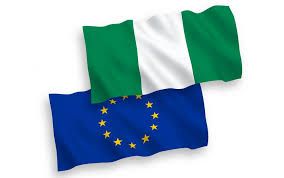
In a significant step toward enhancing international legal cooperation, the European Union Agency for Criminal Justice Cooperation (EUROJUST) and Nigeria’s Federal Ministry of Justice have signed a working arrangement aimed at strengthening collaboration in combating transnational organized crime.
The agreement follows a series of high-level engagements between both parties in 2023 and marks the beginning of its formal implementation phase.
Speaking at a meeting held in Abuja, Vice-President of EUROJUST, Mr. José de la Mata Amaya, underscored the importance of mutual commitment in addressing the complexities of organized crime.
“Crime is borderless,” Amaya stated. “This is why it is essential for countries and justice agencies to work hand in hand to ensure criminals are held accountable, regardless of jurisdiction.”
The meeting, hosted by the European Union Delegation to Nigeria, brought together key stakeholders, including the EU Ambassador to Nigeria and ECOWAS, Ambassador Gautier Mignot; Nigeria’s Solicitor General, Beatrice Jedy-Agba, ambassadors from EU member states and representatives from the United Nations Office on Drugs and Crime (UNODC).
The forum provided a platform to deepen mutual understanding between the EU and Nigerian legal systems, with discussions focused on identifying shared challenges, best practices, and areas for more effective collaboration.
In her remarks, Jedy-Agba emphasized the importance of building practical and sustainable legal frameworks for cooperation. She noted that Nigeria, like its EU counterparts, faces increasing challenges posed by international criminal networks and welcomed the support offered under the new arrangement.
Both sides agreed that stronger cooperation is vital not only for ongoing cases but also for broader efforts in harmonizing justice responses to cross-border crimes.
“This meeting allows us to better understand one another, define best practices to enhance cooperation, and openly discuss any challenges that may exist—whether in EU member states assisting Nigeria, or in Nigeria assisting EU countries,” said Amaya.
The working arrangement is expected to improve coordination on mutual legal assistance, joint investigations, evidence-sharing, and prosecution strategies, ultimately contributing to more robust criminal justice outcomes in both Nigeria and EU jurisdictions.





